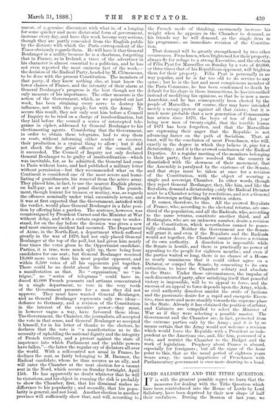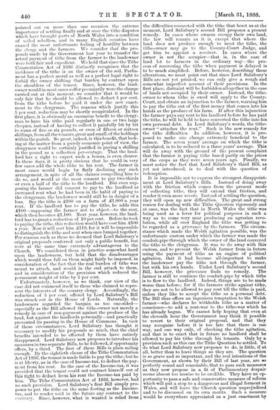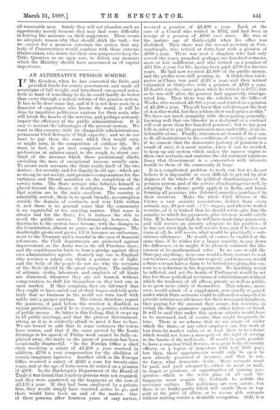LORD SALISBURY AND 111.E. TITHE QUESTION.
TT is with the greatest possible regret we learn that the measures for dealing with the Tithe Question which have been reintroduced into the House of Lords by Lord Salisbury, have been deprived by their new shape of half their usefulness. During the Session of last year, we pointed out on more than one occasion the extreme Importance of settling finally and at once the tithe disputes which have brought parts of North Wales into a condition of veiled rebellion, and in many English counties have caused the most unfortunate feeling of hostility between the clergy and the farmers. We consider that the pro- posals made by the Government last year to transfer the actual payment of tithe from the farmer to the landowner were both fair and expedient. We hold that since the Tithe 'Commutation Act of 1836 distinctly recognises that the incidence of the tithe is on the owner of the soil, Parlia- ment has a perfect moral as well as a perfect legal right to forbid the owner shifting that burden by contract upon the shoulders of the tenant. Since, however, the land- owner would in most cases suffer pecuniarily were the change carried out at this moment, we consider that it would be only fair that he should be allowed to deduct 5 per cent. from the tithe before he paid it under the new enact- ment to the clergyman. The reasons which justify this 5 per cent. reduction may be shortly recapitulated. In the "first place, it is obviously an enormous benefit to the clergy- man to have his tithe paid regularly in one or two large cheques, instead of having to collect it painfully bit by bit in sums of five or six pounds, or even of fifteen or sixteen shillings, from all the tenants, great and small, of the holdings within the parish. So great, indeed, is this benefit, that look- ing at the matter from a purely economic point of view, the clergymen would be certainly justified in paying a shilling in the pound as a collection per-centage. That the land- lord has a right to expect such a bonus, is even clearer. In these days, it is pretty obvious that he could in very few cases add the whole tithe to his rent. The farmer in most cases would begin by flatly declining any such arrangement, in spite of all the clauses compelling him to --do so, and would at the most consent to pay two-thirds -or even a half of the tithe to the landlord. But even sup- posing the farmer did consent to pay to the landlord as increased rent what he had been in the habit of paying to the clergyman, the landowner would still be in danger of a loss. Say the tithe is £100 on a farm of £1,000 a year rent. If the landlord has to pay the tithe, he adds this £100—supposing the farmer not to object—to the rent, which then becomes £1,100. Next year, however, the land- lord has to grant a reduction of 10 per cent. Before he took to paying the tithe, this reduction would have cost him £100 a year. Now it will cost him £110, for it will be impossible to distinguish the tithe and rent when once lumped together. For reasons such as these we deemed that Lord Salisbury's original proposals conferred not only a public benefit, but were at the same time extremely advantageous to the Church. We considered them in practice somewhat hard upon the landowners, but held that the disadvantages which would thus fall on them might fairly be imposed, in consideration of the fact that the real burden of tithe was meant to attach, and would in the end attach to them, and in consideration of the provision which reduced the • permanent weight of tithe by 5 per cent. Unfortunately, however, as we think, our view of the case did not commend itself to those who claimed to repre- sent the interests of the country clergy. Accordingly, the reduction of 5 per cent. offered by Lord Salisbury's Bill was struck out in the House of Lords. Naturally, the landowners regarded the bargain as too one-sided— ,especially as the Bill allowed the tithe-owner not merely a remedy in case of non-payment against the produce of the land, but against the landlords personally—and practically prevented its passing in the House of Commons. In view of these circumstances, Lord Salisbury has thought it necessary to modify his proposals so much, that the chief benefits intended to be effected by them have entirely disappeared. Lord Salisbury now proposes to introduce his measures in two separate Bills, to be followed, if opportunity offers, by a third. The first of these Bills is plain sailing -enough. By the eightieth clause of the Tithe Commutation Act of 1836, the tenant is made liable to pay the tithe; but he is at liberty, as in the case of Income-tax, to deduct the pay- ment from his rent. In the case of the Income-tax, it was provided that the tenant could not contract himself out of this right to deduct from his rent the Income-tax paid by him. The Tithe Commutation Act of 1836, however, had no such provision. Lord Salisbury's first Bill simply pro- poses to put the tithe on the same footing as the Income- tax, and to render void in the future any contract to the contrary. Since, however, what is wanted is relief from the difficulties connected with the tithe that beset us at the moment, Lord Salisbury's second Bill proposes a present remedy. In cases where owners occupy their own land, the law will remain as it is, except that where the land does not produce enough to meet the tithe, the tithe-owner may go to the County-Court Judge, and get him to appoint a receiver. In cases where the owner is not the occupier—that is, in the case of land let to farmers in the ordinary way—the pro- cess of recovering the tithe when payment is delayed is to be much simplified. Before, however, describing these alterations, we must point out that since Lord Salisbury's Bills are not yet printed, we can only give a rough and somewhat imperfect account of their provisions. In the first place, distraint will be forbidden altogether in the case of lands not occupied by their owner. Instead, the tithe- owner to whom tithe is owed will apply to the County Court, and obtain an injunction to the farmer, warning him to pay the tithe out of the first money that comes into his hands as the produce of his farm. If after this injunction the farmer pays any rent to his landlord before he has paid the tithe, he will be held to have converted the tithe into his own personal debt. In Lord Salisbury's words, the tithe- owner "attaches the rent." Such is the new remedy for the tithe difficulties. In addition, however, it is pro- posed to make one change extremely beneficial to the farmer. The seven years' average on which the tithe is calculated, is to be reduced to a three years' average. This will do away with the ground of the present complaint that the farmer is paying tithe based partly on the prices of the crops as they were seven years ago. Finally, we must notice the fact that Lord Salisbury's third Bill, as yet not introduced, is to deal with the question of redemption.
It is impossible not to express the strongest disappoint- ment at Lord Salisbury's Bills. Instead of doing away with the friction which comes from the present mode of collecting tithe, they will extend that friction, and render it even more severe. Instead of settling the question, they will open up new difficulties. The great and strong reason for dealing with the Tithe Question vigorously and at once, was the fact that in North Wales the tithe was being used as a lever for political purposes in such a way as to come very near producing an agrarian revo- lution, while all over England the tithe was getting to be regarded as a grievance by the farmers. The circum- stance which made the Welsh agitation possible, was the unfortunate custom under which the farmer was made the conduit-pipe through which the owner of the land conveyed the tithe to the clergyman. It was to do away with this custom, and to prevent the Welsh farmer from in future using the payment of tithe as an engine of political agitation, that it had become all-important to make the landowner pay the tithe not through the farmer, but with his own hands. Under Lord Salisbury's second Bill, however, the grievance finds no remedy. The farmer is still to continue the conduit-pipe by which tithe is to flow to the landlord. Indeed, things are to be made worse than before ; for if the farmers strike against tithe, they are not to be allowed to pay rent till the tithe is paid, unless they like to accept the tithe as a personal debt. The Bill thus offers an ingenious temptation to the Welsh farmer—who declares he withholds tithe as a, matter of conscience—to add a rent-war to the tithe-war which he has already begun. We cannot help hoping that even at the eleventh hour the Government may think it possible to revert to their original proposal, and that they may recognise before it is too late that there is one way, and one way only, of checking the tithe agitation, and that is to enact that in future no landlord shall be allowed to pay his tithe through his tenants. Only by a provision such as this can the Tithe Question be settled. To do what Lord Salisbury now proposes to do, is little, if at all, better than to leave things as they are. The question is so grave and so important, and the real intentions of the Government, as shown by their Bill of last year, are so perfectly sound and reasonable, that to pass such measures as they now propose in a fit of Parliamentary despair seems almost too unwise to be credible. They have an op- portunity to pass a safe and conservative measure of reform which will put a stop to a dangerous and illegal ferment in Wales, and will leave the Church question unprejudiced and to be discussed on its own merits. Such a measure would. be everywhere appreciated as a just enactment by all reasonable men. Surely they will not abandon such an opportunity merely because they may find some difficulty in forcing the measure on their supporters. There seems no adequate reason why they should shirk the task,—for we cannot for a moment entertain the notion that any body of Conservatives would combine with those extreme Gladstonians, who desire for their own purposes to keep the Tithe Question as an open sore, to defeat any measure which the Ministry should have announced as of capital importance.




































 Previous page
Previous page